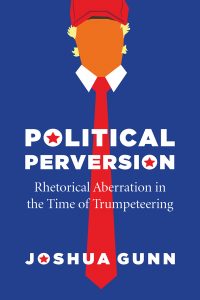Four Questions with Joshua Gunn, author of “Political Perversion”
As election season progresses, we spoke with Joshua Gunn, author of Political Perversion: Rhetorical Aberration in the Time of Trumpeteering. Below, he discusses political rhetoric, structural perversion, public affect, and what Trump (and his Twitter) reveals about American culture.
First of all, what got you started on writing this book?
Political Perversion originally started as an essay I was writing on the television series, American Horror Story. For a couple of years after the show debuted, I was trying to make sense of why horror television series were turning to perverse scenarios (explicit S&M), perverse villains (Hannibal), and perverse anti-heroes in prime time (Dexter). We have long been used to perversity in cinema—right down to the basic voyeurism of staring at actors in the dark. As a fan of horror, however, this newer prime-time perversity, intended for viewing in more intimate spaces, says something about cultural shifts.
So, after researching the way perversion was discussed in various fields and in popular parlance, I started writing about horror TV around the same time that Trump announced his candidacy. I was watching one of the Republican presidential candidate debates (the one that ultimately orbited around a penis-size repartee), and then it occurred to me that Trump’s perverse campaign was the real horror show.
The day after the debate I found myself writing short pieces intended for popular outlets and newspapers about the perversity of politics, but no one bought my pitch.Then I started sketching out an academic essay on what perverse political rhetoric is and how it works, with Trump as the exemplar. I realized when the essay got to fifty pages that I wasn’t just writing an essay.
You write about a structural perversion in American culture. Where does this perversion come from (or, why did it take root in America)?
I got the idea of structural perversion from Jacques Lacan, who advanced the argument—following Freud–that there is something like a universal or common perversion that we all share. Perhaps the most fundamental is that people do all sorts of things with food that have nothing to do with nourishment and have sex for all kinds of reasons that have little to do with reproduction. We are all, in one way or another, perverse. But this kind of perversion is a behavior or trait, and today we tend to police what is permissible perversion with the notion of “mutually informed consent.”
Then there is structural perversion, which for Lacan refers to a series of (largely defensive) strategies a person has for relating to others, usually developed in youth. These strategies orbit around denying a reality and acknowledging it at the same time, as if to say, “I know what I am doing is wrong, but I’m doing it anyway.” Having a perverse structure does not necessarily mean a person will behave immorally or with criminal intent, but we tend to notice those who do so conspicuously.
The book joins those who are most interested in Freud’s later works on culture (which do not, sadly, get as much play as the earlier works), as well as those scholars who apply and modify Adorno, Althusser, and Lacan’s arguments about culture: our self-conscious persons are articulated or produced by culture–just like the idea of the family is. So, what if we think about groups, communities, or cultures as exhibiting a form of structural psychosis or perversion homologous to individuals? Doing so puts us into the realm of ideology.
Of course, many have argued that the United States is based on a founding perversion, that “all men are created equal,” which is to say a form of structural perversion is sort of baked into the cake of the country. Were this not the case, I don’t think we would see so many full-throated defenses of Confederate monuments, or two accident attorneys brandishing weapons in front of their mansion as Black Lives Matter protesters march by peacefully. I think what many are collectively witnessing for the first time are the bones, literally and figuratively. Of course, the abused, oppressed, and murdered among us have been well aware of these foundational perversions for centuries, and in some sense those of us in the critical humanities have been performing cultural autopsies for quite a while. But for those of us who are starting to “see” ideological perversion for the first time, there have been many responses. One response to the ghastly glimpses is to work toward restructuring our frame in multiple senses; another response is more radical—let’s get a new frame altogether; and yet another is to defend the perverse set-up, even amplify it rhetorically by disenfranchising LGBTQ+ folks, advocating for violence toward immigrants seeking asylum . . . I could go on and on. Political Perversion is most concerned with a critique of the perverse, amplified rhetoric of defense we’ve endured over the last five years.
“This is a kind of political perversion that extends beyond mere contradiction: it is the affirmation of a reality that is denied at the same time, an orientation toward others that is both increasingly comfortable for some and obnoxious to others.”
Since the 2016 election and the rise of Trump—a central character in your book—have you seen a shift in American rhetoric?
Public or mass rhetoric in the US is always shifting, of course, and studying those shifts tells us something important about our society and our history that we otherwise might not notice, especially about affect and feelings. I do think, however, that most folks I have talked to about politics since the election believe something has changed—beyond what I think is the mistaken argument about rising “incivility” in our culture (if you study US public address, one is soon disabused of that notion). This “something” that has changed, often perceived as coming from Washington DC and radiating outward, is intimately connected to changing communication technologies and the way our modes of speech are morphing in tandem.
Trump’s Twitter pulpit is an obvious example of a style and genre of speaking that is experienced as novel in affect, effect, and speed, which is why studying rhetoric is so helpful for getting at underlying patterns that are not necessarily new at all. Even so, scholars in the humanities and social sciences are still trying to wrap our heads around how our rapidly changing, mediated environment is not simply creating novel forms speech, but also rewiring or rerouting how we think and feel toward each other in conscious and unconscious ways.
What is both fascinating and frightening to me is “reading” Trump as a figure that our society has produced independent of his biological being—or as a number of folks have said, as a “symptom” of cultural changes as well as another revelation of longstanding problems in the polis. Trumpeteering—a culture-regurgitating and generating machine—is an amplification of what we already have as well as the invention of something that seems new, or at least a new configuration. At least right now, the difference in political rhetoric today from five years ago is the obscene transparency of it all and the inability get some sort of clothing back on the Emperor.
We’ve recently wrapped up the Republican and Democratic National Conventions. Are there any particular bits—any words, phrases, speeches, or themes—that have stuck with you?
Well, certainly Kimberly Guilfoyle’s shouted speech will haunt me for years; it’s rhetorically fascinating for many reasons, especially because Ed Muskie’s weeping and the “Dean Scream” seem rather insignificant now. This speech also announces, in a way, the full spectrum of affect that is now possible in public; political aspirations have been destroyed because of public crying or screaming in the past. Of course, I would underscore the policing of gendered vocal norms are also heavily in play here.
Owing to the necessities of distancing in the pandemic, both conventions collapsed to the more intimate conventions of television, the DNC more so than the RNC. There were some remarkably moving speeches as a consequence of the more intimate set-up, the Obamas’ and Brayden Harrington’s speeches in particular.
In general, though, what interested me were the contrasting tones or affective mismatches. Many have remarked that the DNC was more optimistic and upbeat as a whole—although there were plenty of jeremiads—and that the RNC was darker and fear-based. Yet the RNC as a whole was not consistently bleak, particularly with the attempts to argue that the President and the Republican Party are not racist. So there was a bit of rhetorical whiplash for me when speeches about embracing diversity were followed by remarks that re-zoning for low-income housing would unleash criminals and destroy suburbia. This is a kind of political perversion that extends beyond mere contradiction: it is the affirmation of a reality that is denied at the same time, an orientation toward others that is both increasingly comfortable for some and obnoxious to others. This orientation reflects the so-called American Dream touted by both parties, the promise of opportunity and success for everybody while simultaneously maintaining or erecting structures that make such dreaming impossible for most of us.

Joshua Gunn is associate professor of communication studies at the University of Texas at Austin. He is the author of Speech Craft.
Political Perversion is available now from our website or your favorite bookseller.
